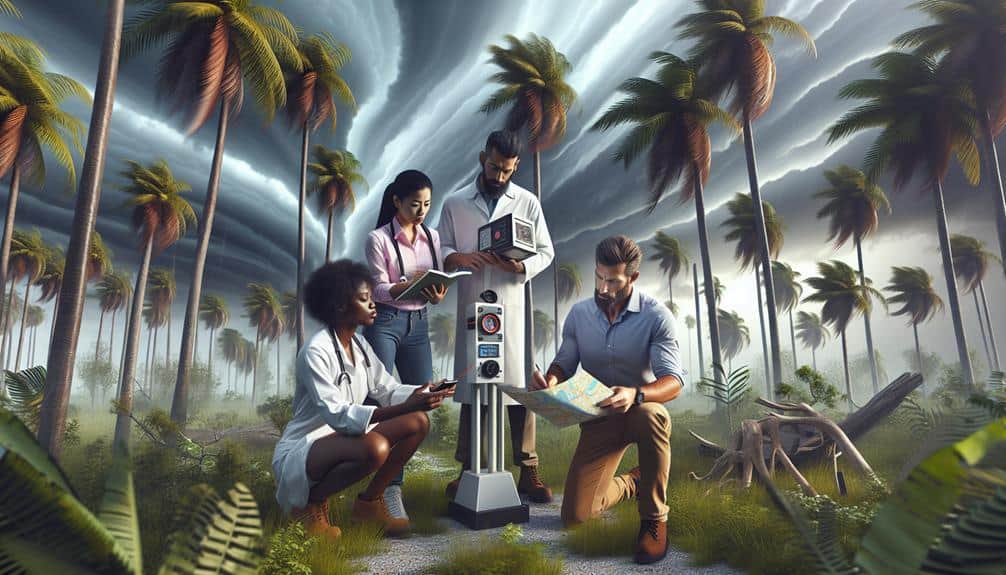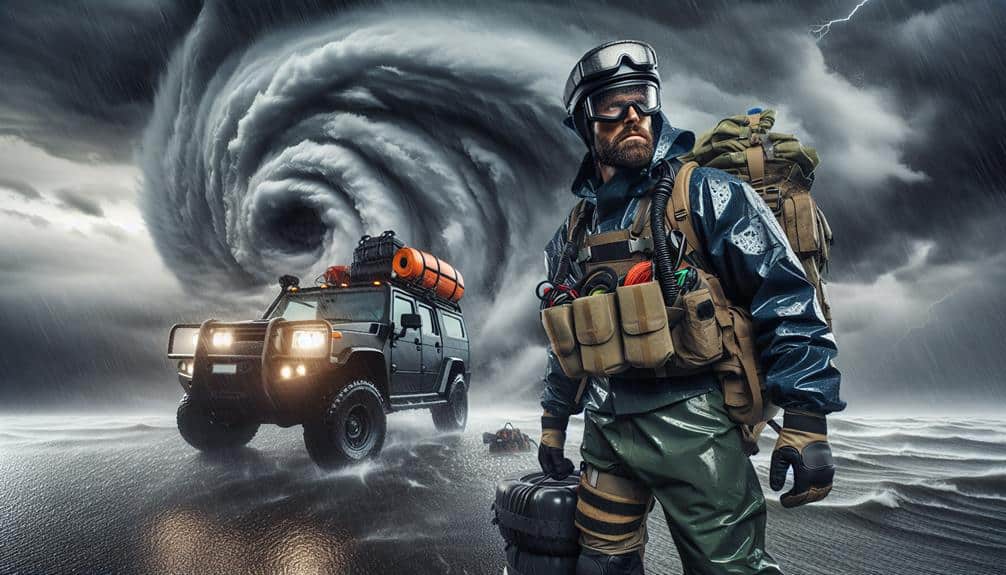When conducting hurricane research expeditions, we prioritize ethical guidelines by ensuring clear informed consent, rigorous safety measures, and minimal environmental impact. We foster trust through transparency and protect personal data. Our teams receive necessary safety gear, real-time weather updates, and have detailed evacuation plans. We use sustainable practices to protect local wildlife and habitats, maintaining data integrity with stringent validation protocols. Engaging local communities is essential; we respect cultural norms, offer educational outreach, and build partnerships to enhance resilience. Through these efforts, we aim to gather crucial data responsibly. There's much more to explore about this topic and our practices.
Key Points
- Obtain informed consent from participants, detailing research scope, risks, and benefits transparently.
- Implement rigorous safety precautions, including real-time weather monitoring and clear evacuation plans.
- Adopt eco-friendly practices to minimize environmental impact and preserve local wildlife and habitats.
- Ensure data integrity through transparent documentation, validation protocols, and safeguarding against tampering.
Informed Consent Procedures
When conducting hurricane research expeditions, we must ensure that all participants fully understand the risks and benefits through clear and detailed informed consent procedures. Our commitment to participant autonomy and research ethics is paramount. By prioritizing informed consent, we empower individuals to make knowledgeable decisions about their involvement.
Consent forms are the cornerstone of our informed consent procedures. These documents must be meticulously crafted to detail the scope of the research, potential hazards, and the benefits of participation. Each participant should have the liberty to ask questions and receive thorough answers before committing. This transparency fosters trust and aligns with our ethical responsibilities.
Confidentiality is another critical aspect of our informed consent process. Participants must be assured that their personal information will be safeguarded. This promise of privacy not only protects them but also promotes a culture of respect and integrity within our research team.
Safety Precautions
Prioritizing safety measures, we must rigorously implement protocols designed to protect both researchers and local communities during hurricane research expeditions. Our commitment to safety begins with thorough emergency response strategies. We need to make sure that every team member is well-versed in these protocols, which include real-time monitoring of weather conditions and the readiness to adapt plans swiftly.
Evacuation plans are a cornerstone of our safety framework. We've got to establish clear, executable routes and procedures well before any expedition begins. These plans should be communicated transparently to all stakeholders, including local authorities and community leaders, guaranteeing everyone knows the steps to take in the event of an emergency.
Additionally, we must equip our teams with the necessary safety gear and training. This isn't just about compliance; it's a moral imperative to safeguard human lives. We should also engage in regular drills to keep our skills sharp and our responses swift.
Environmental Impact
How can we conduct our hurricane research expeditions in a way that minimizes environmental harm while still gathering vital data? We need a balanced approach that respects both nature and our scientific objectives. Our commitment to reducing our carbon footprint and prioritizing ecosystem preservation is essential.
Here's how we can achieve this:
- Sustainable Practices: We should adopt eco-friendly technologies and renewable energy sources for our equipment and transportation. By using electric vehicles and solar-powered devices, we can significantly reduce emissions.
- Minimal Disturbance: Let's guarantee our presence has the least impact on local wildlife and habitats. This means avoiding sensitive breeding sites, using drones instead of helicopters, and scheduling our activities to minimize disruption to natural behaviors.
- Waste Management: Proper disposal and reduction of waste materials are indispensable. We should carry out all waste, recycle whenever possible, and use biodegradable materials to prevent pollution.
Data Integrity
While respecting environmental considerations, we must also secure the accuracy and reliability of the data we collect during our hurricane research expeditions. It's imperative that we adhere to the highest ethical standards to validate our findings are both credible and useful.
Research transparency is key; we owe it to the public and scientific community to clearly document our methodologies, data sources, and any potential biases.
To maintain data integrity, we must implement rigorous validation protocols. This means cross-referencing our data with independent sources and employing redundancy in data collection to minimize errors. Our commitment to ethical standards extends to safeguarding our data against tampering or misrepresentation. We must be vigilant in maintaining secure storage and precise calibration of our instruments.
Moreover, transparent reporting fosters trust and collaboration. By making our data and processes openly accessible, we enable peer review and verification, which strengthens the overall body of hurricane research.
It's not just about gathering information; it's about securing that the information serves its purpose in advancing our collective understanding and preparedness.
In doing so, we uphold the principles of scientific integrity and contribute to a more informed and resilient society. Our moral responsibility is clear: prioritize data integrity to benefit both current and future generations.
Community Engagement

Engaging local communities in our hurricane research expeditions ensures that our efforts are grounded in the real-world needs and perspectives of those most affected. We must prioritize stakeholder involvement, making sure that local voices guide our research objectives and methodologies. This isn't just ethical; it's vital for effective, lasting outcomes.
Stakeholder Involvement: By involving local stakeholders in decision-making processes, we acknowledge their invaluable knowledge and lived experiences. This collaborative approach fosters trust and guarantees our research aligns with their priorities.
Educational Outreach: We need to actively share our findings through educational outreach, empowering communities with the information they need to better prepare for future hurricanes. Workshops, seminars, and accessible resources can make a significant impact.
Cultural Sensitivity and Local Partnerships: Respecting cultural norms and building local partnerships are essential. Understanding cultural contexts allows us to approach our work with humility and respect, ultimately enhancing our research's relevance and impact.
Our commitment to community engagement is more than a policy; it's a moral imperative. By integrating these principles, we not only enrich our research but also support the freedom and resilience of the communities we aim to serve.
Frequently Asked Questions
What Qualifications Are Required for Researchers on Hurricane Expeditions?
We need qualifications, experience, and training in data collection, using technologies and equipment. Our expertise must include communication strategies, public outreach, and understanding funding sources. Research duration and timeframe are essential for financial compensation and effective expedition planning.
How Are Expedition Findings Communicated to the Public?
We share expedition findings through public engagement, media coverage, and educational initiatives. We believe in transparency, fostering awareness, and empowering communities. By informing the public, we promote informed decision-making and proactive conservation efforts.
Are There Financial Incentives for Participating in Hurricane Research?
We need to weigh financial incentives against ethical considerations in hurricane research. While financial support is essential for our work, we must guarantee our actions align with moral principles and contribute to preserving freedom and safety.
What Technologies Are Used to Study Hurricanes in the Field?
We utilize remote sensing, drones, weather balloons, and radar to study hurricanes in the field. These technologies enable us to gather vital data, promoting safer communities and informed policies, while respecting nature's power and our collective freedom.
How Long Do Typical Hurricane Research Expeditions Last?
Typical hurricane research expeditions last several days to weeks, depending on the storm's duration and field conditions. We prioritize conservation, crafting policies that balance freedom with the need to study and protect our environment efficiently.

